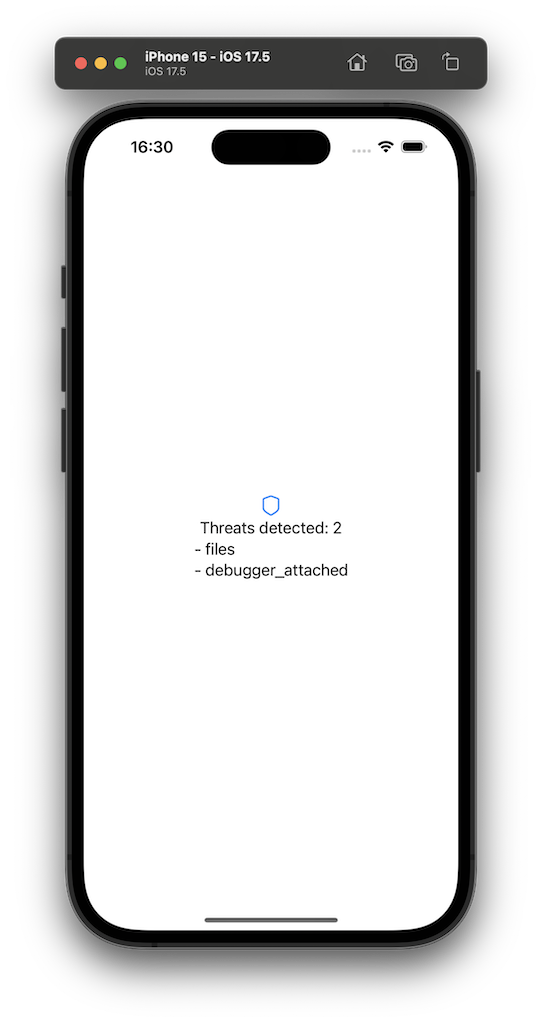C7Detect is a library for detecting security risks in iOS / macOS libraries and applications.
- Threats detected
- Requirements
- Installation
- Usage
- Types of threats
- What if?
- About this library
- License
- Running on Simulator.
- Running from Xcode.
- Debugger attached/present.
- Malicious processes.
- Malicious files.
- Jailbreak.
- Unprotected Sandbox.
- iOS 13.0+
- macOS 13.0+
The Swift Package Manager is a tool for automating the distribution of Swift code and is integrated into the swift compiler.
Once you have your Swift package set up, adding C7Detect as a dependency is as easy as adding it to the dependencies value of your Package.swift or the Package list in Xcode.
dependencies: [
.package(url: "https://github.com/capa7-io/C7Detect.git", .upToNextMajor(from: "1.0.0"))
]Normally you'll want to depend on the C7Detect target:
.product(name: "C7Detect", package: "C7Detect")But if you want to avoid detections in simulators (do not do this in production versions), you can depend on the C7DetectDevelopment target:
.product(name: "C7DetectDevelopment", package: "C7Detect")CocoaPods is a dependency manager for Cocoa projects. For usage and installation instructions, visit their website. To integrate C7Detect into your Xcode project using CocoaPods, specify it in your Podfile:
pod 'C7Detect'The pod 'C7DetectDevelopment' is also available for development purposes.
If you prefer not to use any of the aforementioned dependency managers, you can integrate C7Detect into your project manually. Download this repository and copy the C7Detect.xcframework available at the Frameworks folder inside your project.
- Implement a class named C7DHandler with the following content.
import Foundation
@objc(C7DHandler)
final class C7DHandler: NSObject {
private static var semaphore = DispatchSemaphore(value: 1)
private static var _threatsDetected = [NSNotification]()
// Returns the detected threats.
public static var threatsDetected: [NSNotification] {
return _threatsDetected
}
@objc
func on(notification: NSNotification) {
// Wait for the semaphore
C7DHandler.semaphore.wait()
// Store the notification (could be map to any other domain model)
C7DHandler._threatsDetected.append(notification)
// Release for the semaphore
C7DHandler.semaphore.signal()
}
}- Query threadsDetected before performing any sensitive operation in your library or application, in order to detect threats. If C7DHandler.threadsDetected is not empty then there is a risk that a malicious actor is trying to modify and/or intercept information in your code.
There is a sample application that uses C7Detect (which triggers events in devices and simulators) at SampleApp/C7DetectSampleApp.xcodeproj.
We categorize threats into two categories: client/device compromised and library compromised. All threats of the type client/device compromised can be reported to the client application (or framework) so that the app can decide how to handle this information.
On the other hand, threats categorized as library compromised cannot be reported, as there is no guarantee that trusted code will receive the error to handle it properly. This type of threat will result in a runtime crash.
- Running on Simulator.
- Running from Xcode.
- Debugger attached/present.
- Malicious processes.
- Malicious files.
- Jailbreak.
- Unprotected Sandbox.
- Method swizzling in C7Detect entities
- Method swizzling in C7DHandler
- Invalid or modified C7Detect framework
- I don't implement C7DHandler
Either if you forget to implement this class, or some malicious actor removes any trace at runtime of this class, C7Detect will throw a runtime exception, crashing your application and showing a missing threats handler error on the console.
- Somebody changed the implementation of C7DHandler (method swizzling)?
C7Detect has a built-in protection that verifies if the C7DHandler was manipulated or overwritten. If this verification fails a runtime exception will be thrown, crashing your application and showing a runtime integrity error on the console.
- Somebody tries to change something in C7Detect framework?
Also in this case a runtime exception will be thrown, crashing your application and showing a runtime integrity error on the console.
- It does not provide obfuscation for libraries or applications.
- It does not protect the C7Handler class that receives the detected threats. This protection should be provided by a a tool that secures your library or application.
This repository contains a C7Detect version for development (C7DetectDevelopment) which does not perform threats detection on Simulators. Use it wisely.




